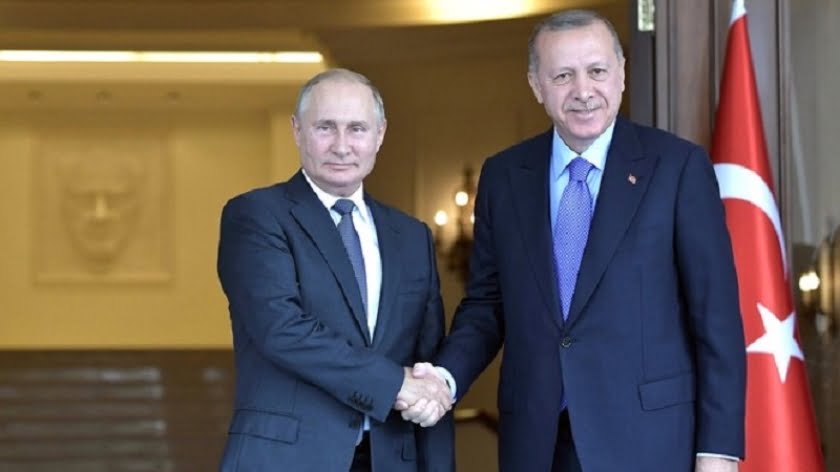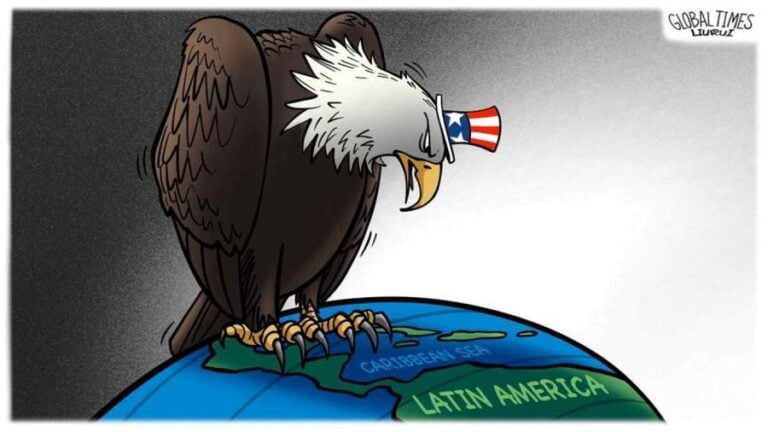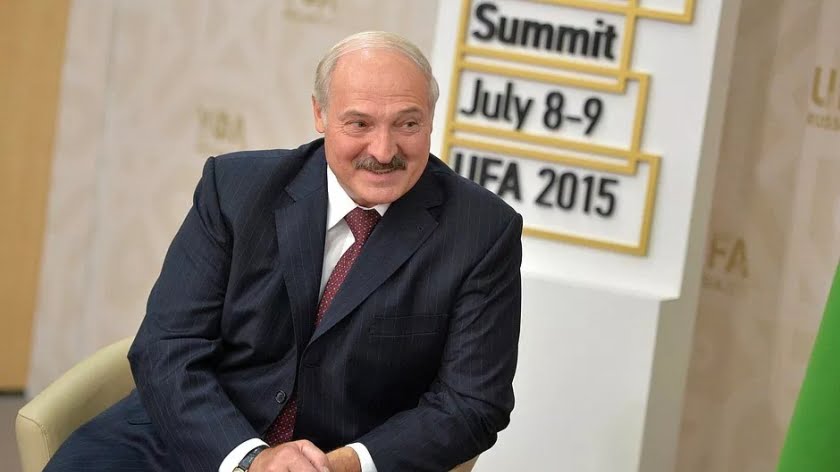The Latest Putin-Erdogan Summit Synchronizes Their Regional Strategy
President Putin’s latest summit with President Erdogan is no longer just about celebrating the opening of the TurkStream pipeline, but about synchronizing Russia and Turkey’s regional strategy after the latest developments in the broader Mideast, which will greatly strengthen their ever-growing strategic partnership.
Regional Backdrop
President Putin is in Turkey to celebrate the opening of the TurkStream pipeline, but his trip takes on a grander significance against the backdrop of recent developments in the broader Mideast. President Erdogan is progressively deploying the Turkish military to Libya at the request of its UN-recognized government following an escalation in that North African country’s civil war simultaneously with planting the Turkish flag across a broad swath of the Eastern Mediterranean in order to disrupt the Greece-“Israel“-Cyprus (GRISCY) pipeline. The situation surrounding Syria’s Idlib is always tense, but the continued US’ occupation of the northeastern energy-rich part of the Arab Republic has been thrown into question after Trump’s assassination of Maj. Gen. Soleimani in Baghdad resulted in Iraq passing a non-binding resolution demanding the withdrawal of American troops from there which could jeopardize their access to Syria. On top of that, the US and Iran are at the verge of war after that assassination, and it’s anyone’s guess what form the Islamic Republic’s promised revenge will take.
Libya
The timing of the latest Putin-Erdogan Summit therefore couldn’t have been better since both leaders need to synchronize their regional strategy in the face of these rising challenges. There has been a steady flow of unconfirmed reports over the past two years alleging that Russian mercenaries are supporting Libya’s General Haftar, which would put them on the opposite side of Turkey’s uniformed ones following Ankara’s ongoing deployment to the country. It’s important for the two leaders to candidly discuss the real state of affairs in the former Jamahiriya in order to avoid any unintentional crises arising between them over forthcoming military developments there. It should be said, however, that even if the rumors are true (and it’s impossible to independently confirm them), then even the “worst-case” scenario of a “proxy war” between Russia and Turkey in Libya would be unrealistic since the two countries are much too closely tied together through TurkStream, the S-400s, commerce, and the Syrian peace process for any supposed mercenaries to tear them apart.
Eastern Mediterranean
Moving eastward along this newfound “arc of crisis”, President Putin will certainly want to hear what end game President Erdogan has in mind concerning his recent claims over a large portion of disputed Eastern Mediterranean territory. Russia supports international law, but it also understands that countries pursue their national interests as they understand them whenever the legal situation is disputed like it is in the Eastern Mediterranean. With that in mind, it’s inclined to tacitly support Turkey’s claims because they interfere with the envisaged route of a competing pipeline (GRISCY). Those claims, though, are dependent on the UN-recognized Government of National Accord (GNA) remaining in power in Libya and retaining the maritime agreement with Turkey, so its possible fall at the feet of Gen. Haftar’s forces could reverse that decision and thus unlock GRISCY’s access to Europe unless Turkey was willing to use military force to unilaterally defend its claims. This shrewd geo-energy calculation might thus help Russia and Turkey reach an understanding in Libya.
Syria
Concerning Syria, Russia’s official stance is that all foreign forces not invited into the country by its democratically elected and legitimate government must eventually leave, starting with the US and then eventually involving Turkey too despite Ankara’s role in the Astana peace process. It’s Turkey’s military coordination with Russia, however, which compels Moscow to behave very pragmatically with it despite the speculative disappointment of those in Damascus who would like to see Russia playing a more active role in removing Turkish forces from Syria. The excellent coordination between Russia and Turkey there in spite of Syria’s misgivings speaks to the importance that Moscow places on “compromising” with Ankara on certain issues in the spirit of friendship that pervades their strategic partnership. Such coordination could be further strengthened in the event that the US removes its military footprint from Northeast Syria and lets the Kurdish separatists under its sway loose to wreck havoc with Turkey’s national security as a “parting gift” to them all.
Iraq
That remains to be seen, however, since such a scenario is largely dependent on whether or not the US can retain its access to the region via Iraq. The majority of the country’s Arabs want America to withdraw so as to avoid having their country caught up in an intensified US-Iranian proxy war following Maj. Gen. Soleimani’s assassination, but the Kurds want them to stay and this could spark a constitutional crisis if Erbil doesn’t back down. A renewed cycle of chaos in Iraq could also spill over into Syria, thus indirectly affecting Russian and Turkish interests, to say nothing if the US’ militant support of a second round of Kurdish separatist aspirations runs the risk of succeeding and thus potentially creating a serious national security crisis along Turkey’s southern border. Ankara already regularly intervenes there from time to time in order to destroy suspected PKK terrorists and their encampments, but any more significant intervention along the lines of its three Syrian ones and current Libyan deployment might prove to be too much by stretching its military too thin.
US-Iran
Presidents Putin and Erdogan will probably discuss that scenario because it could lead to a reduction of Turkey’s military forces in Syria should that happen, but most of all, they’ll certainly talk about the latest US-Iranian tensions considering that the Islamic Republic is their fellow partner in the Astana peace process among other reasons. Intensified US-Iranian proxy warfare in Syria would affect Russian and Turkish interests more powerfully than the spillover of Iraqi chaos into the Arab Republic, so it must certainly be addressed and a coordinated approach to that eventuality must be agreed to, not just in the narrative sense of condemning the US, but in the practical one of what they’d actually do (if anything) if that happens. Moreover, the “worst-case” scenario of a conventional US-Iranian war can’t be dismissed either, which would have direct implications for Turkey and indirect ones for Russia (both in and of itself and because of how it could affect Turkey). Both leaders must eventually agree upon a joint plan of action for mitigating the regional consequences of that scenario and possibly even providing some form of (likely non-military) aid to the Islamic Republic before that happens and definitely afterwards should it transpire.
Concluding Thoughts
All in all, for as much as some forces (both state-level and in the Alt-Media Community) wish that Russian-Turkish relations would deteriorate as a result of the aforementioned five regional crises simultaneously unfolding across the broader Mideast, that’s not likely to happen considering just how close they’ve become ever since the failed pro-American coup attempt against President Erdogan in summer 2016. The very purpose of this latest summit, TurkStream, ties the two together in a system of complex strategic interdependence that won’t be easily undone, as does their trusted military coordination in Syria through the Astana peace process. While it can be argued that they might possibly be pursuing different ends in Libya, that peripheral conflict isn’t important enough to reverse all of the progress that’s been made in bilateral relations over the past few years, especially since the rumors only allege that Russian mercenaries “might” be present, not uniformed members of the Russian Armed Forces, thus making any potential “proxy” damage manageable. As for the possibility of a US-Iranian hot war that’s on everyone’s minds right now, both countries appear to be on the same page of ruling out any military intervention in support of either side, preferring instead to stay out of the fray and then coordinate their approach to its unpredictable aftermath if it actually happens.
By Andrew Korybko
Source: One World







